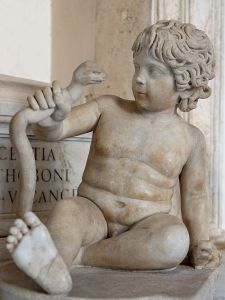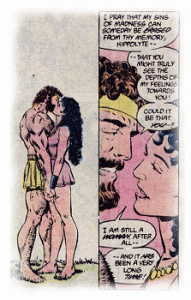There is a recurring theme in multiple mythologies. It is that of a man endowed with incredible strength. I’m sorry, ladies, but this concept emerged from male-dominated societies. I’m not talking about what should be – just what was. The nature of the strong man is varied. To explain this, let us examine some examples (sorry for the bizarre alliteration…).
Heracles
This is his name in Greek mythology (Hercules in Roman mythology; you may have gathered by now that the Romans were borrowers). He is a demigod, the son of Zeus and a mortal woman named Alcmene. His prowess is therefore in between that of a god and a man. Below, he is shown as a child strangling a serpent that was sent to kill him.

But he got bigger…

and did stuff…

… sometimes very bad stuff, sometimes heroic stuff, sometimes a bit of both. He has been shamelessly ripped off by Marvel Comics…

and by DC Comics.

Just when I thought I was researching a fairly safe topic, I found out that things turned ugly in the DC Universe in the 1980s when he was portrayed as subduing and raping Queen Hippolyta of the Amazons, the mother of Wonder Woman. In this story, the Amazons in general were drugged and sexually assaulted by his men during a banquet of friendship (an attempt at peacemaking) hosted by the gracious Amazons after they had foiled a first attempt at conquest.
I found this out when I was looking for images to include in this post. I stumbled across a rather offensive and salacious illustration which I decided not to use. Why not? Because it’s my site, and I don’t want to. It was glossed-over, sugar-coated violence against women. Such subject matter began to be covered for purposes of realism, but the imagery and plot are unrealistic treatments. The ugly simply isn’t ugly enough. I have issued this warning before about comics and animation being used in this way. This example underscores the concerns I raised in my post, Graphic Mythology: A False Feminism.
Anyway, I read a synopsis or two of the story and looked into its historical background. It was released during an allegedly feminist period in the development of the Wonder Woman series – ironically, a time when artist and writer George Perez was consulting with Gloria Steinem. The extended story line involves revenge, punishment imposed by the gods, repentance, and forgiveness. That’s supposed to be a good turn of events, right? And then there was this…
Hippolyta has a brief romance with her reformed rapist. DC also did this in their critically acclaimed Watchmen in the sequence when Sally Jupiter willingly had a child by the Comedian some time after his unsuccessful attempt at assaulting her. My concern is that the above imagery and plot device (intentionally or not) reinforce the destructive falsehood that women actually like being sexually mistreated by men. Despite their sensationalism and controversy, these are examples of what has become a tired convention. Better stories are out there, waiting to be discovered/imagined.
The DC story I have been picking on from the Wonder Woman series is a very distorted version of the original myth concerning the ninth labor of Heracles in which he was told to take the belt of Hippolyte, which had been given to her by Ares, the god of war. Perhaps this is how the comic version got away with it. If you’ve read much about him, then you also know that Heracles was no Boy Scout.
Though western civilization is derived primarily from a combination of Judeo-Christian and Greco-Roman influences, the ancient Greeks clearly did not have politically correct morals and ethics when it came to the treatment of women. But I want to emphasize that we are not the ancient Greeks and that we should aspire to something better.
(to be continued…)

I am sadden to see this done by DC. Sexual assault is not something that is okay to see lightly. By the way Lord willing this Friday I plan to post a review of a Graphic Novel that I really liked from DC that I enjoyed and was suprisingly very wholesome.
LikeLiked by 1 person
Graphic novels, even those from the same company, are obviously a mixed bag. I look forward to reading your post on Friday. Take care.
LikeLiked by 1 person
I wouldn’t say the comic book suggested women don’t mind getting sexually assaulted. I bet no one with a right mind would think take it as that. The only people who would, would probably be people with no right mind but even they wouldn’t care about it because they wouldn’t need a comic book story to convince themselves to rape someone.
LikeLiked by 1 person
Perhaps I should have chosen different words. My main point, whether clearly stated or not, is that I can’t imagine a woman becoming romantically entangled with a man who once raped her. I’ve seen first hand the after effects of sexual assault on a few of my students over the years, and it just doesn’t square with what I saw in those cartoon panels. My concern is that the portrayal of later acceptance might be seen as mitigating the severity of the offense. The negative acculturation of boys in this society is a demonstrated problem. I don’t think a comic is likely to convince them to commit rape, but it might lead them to believe that certain behaviors are not illegal when they actually are. In my previous post, A False Feminism, I pointed to a statistic that 4 out of 5 college males who have committed sexual assaults felt they had done nothing illegal. Comics have a remarkable ability to hang out in exactly those kinds of “gray” areas which, in fact, are not gray at all when examined more closely. For a good example of the responsible treatment of sexual assault in a graphic novel, I recommend reading Victory in the Astro City series. Thanks for your comment. I was hoping to strike a nerve and stimulate discussion.
LikeLiked by 1 person
I just got more interested in more political topics like feminism, BLM, etc. So I now like to talk about these type of topics.
LikeLiked by 1 person
I’m with you. There’s nothing romantic about being assaulted.
LikeLiked by 1 person
You’re right. I’ve seen the effect it has had on a few of my students over the last 25 years. Take care.
LikeLiked by 1 person
Forgive my redundant comment. I just realized you were commenting on the previous comment.
LikeLiked by 1 person
It’s a great post. N you beautiful mythological way.
LikeLiked by 1 person
Thank you for your compliment, and thank you for following my blog.
LikeLiked by 1 person
Damn autocorrect… U beautifully depicted the mythology n I instantly loved Brad Pitt n Hercules both when I saw troy..
LikeLiked by 1 person
I was raised as a Christian but I’ve always enjoyed reading and studying mythology. Perspective is an amazing concept; I say that because, until I took World Lierature in college, I had never considered my “religion” as being rooted in so much “mythology”. But, there it was, right there among the Gilgameshes, Sudiatas, and the Odysseuses.
I learned that what I–from my perspective–call mythology, Is/was, someone else’s religion.
I like what you revealed about Samson’ s strength coming from God. It’s so obvious that such is the case, but that fact gets lost in the various manifestations.
Thanks
LikeLiked by 1 person
My story is similar in some ways. I like the quote from C. S. Lewis that Christianity is a myth but that it also really happened. I learned to take it more seriously right before I entered college.
LikeLiked by 1 person
I like that quote; describes it well
LikeLiked by 1 person